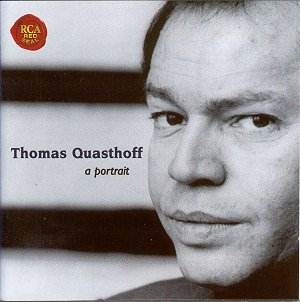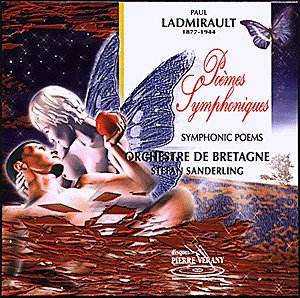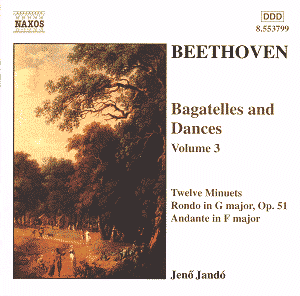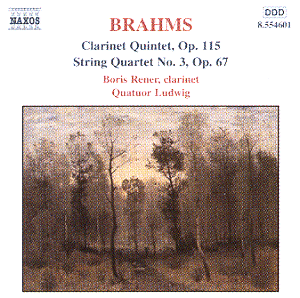 Composer: Thomas Quasthoff
Composer: Thomas Quasthoff
Works: Erlkönig, Der Zwerg, Prometheus, Der Lindenbaum (Winterreise); Mondnacht (Liederkreis, Opus 39), Im wunderschönen Monat Mai (Dichterliebe), Belsazar; Eilt, ihr angefochtenen Seelen, Mein teurer Heiland, laß dich fragen (St. John Passion); Hai gi vinto la causa! (Le nozze di Figaro), Madamina, il catalogo è questa (Don Giovanni), Deh! Vieni alla finestra, o mio tesoro (Don Giovanni), Der Vogelgänger bin ich ja (Die Zauberflöte), Ein Mädchen oder Weibchen (Die Zauberflöte), Pa-pa-pa-pa (Die Zauberflöte); Des besten Königs Wink und Wille (Fidelio)
Performers: Thomas Quasthoff (baritone), Charles Spencer (piano), Roberto Szidon (piano), Chorgemeinschaft Neubeuern, Bach-Collegium München, Enoch zu Guttenberg (conductor), Württemberg Chamber Orchestra, Jörg Faerber (conductor), South-West German Radio Symphony Orchestra, Josè Collado (conductor), Deborah Voigt (soprano), Elisabeth Norberg-Schultz (mezzo), Matthias Hälle (bass), Günter von Kannen (bass), Ben Heppner (tenor)
Recording: Various, 1992-1998
Label: RCA
Thomas Quasthoff’s compilation, “A Portrait,” is a testament to the baritone’s artistic mastery and profound interpretative insight across a range of core repertoire from the German lieder tradition to operatic arias. This collection, while spanning a decade of performances, presents Quasthoff not merely as a vocalist but as an interpreter deeply engaged with the emotional and textual intricacies of the works he presents. His recordings of Schubert and Schumann stand out, reflecting a rich tradition of lieder singing that is both technically accomplished and imbued with dramatic nuance.
The opening selection, Schubert’s “Erlkönig,” showcases Quasthoff’s extraordinary vocal agility and dramatic urgency. The way he navigates the swift shifts in character—parent, child, and the ominous Erlkönig himself—demonstrates a keen interpretive acumen, where every phrase is imbued with an immediacy that is compelling. His articulation is razor-sharp yet fluid, allowing the text to resonate with palpable urgency. This is further exemplified in “Der Lindenbaum,” where his legato carries the listener through a landscape rich with nostalgic yearning, expertly accompanied by Charles Spencer’s sensitive piano work.
Schumann’s contributions to this collection, particularly “Mondnacht” and “Im wunderschönen Monat Mai,” reveal Quasthoff’s exceptional ability to balance lyricism with emotional depth. His voice blooms with a velvety richness that enhances the lush harmonic textures of Schumann’s music. One might argue, however, that while the selection of songs is beautifully executed, a broader variety could have provided deeper insight into Schumann’s expansive oeuvre. Nonetheless, the performance of “Belsazar” is striking, with Quasthoff’s dynamic range and nuanced phrasing creating a vivid narrative that stands as one of the recital’s highlights.
Quasthoff’s foray into Bach, particularly in the selections from the “St. John Passion,” reveals a voice that is not only technically adept but also deeply expressive. The blend of his baritone with the choir and orchestra under Enoch zu Guttenberg is seamless; his renditions of “Eilt, ihr angefochtenen Seelen” and “Mein teurer Heiland” are imbued with a spiritual gravitas that invites listeners into the dramatic core of the Passion. The engineering captures the warmth of his tone, allowing the rich sonorities of Bach’s counterpoint to emerge with clarity.
The Mozart selections, featuring both comedic and poignant roles, display Quasthoff’s versatility. His portrayal of Don Giovanni is particularly compelling, marked by a commanding stage presence even in the absence of visual performance. The inclusion of Montserrat Caballé as Papagena in “Die Zauberflöte” adds a significant dimension to this segment. Quasthoff’s interaction with her soaring soprano creates a delightful contrast, enhancing the playful character of the duet. However, the juxtaposition of his portrayal of Don Giovanni with that of Leporello raises questions about character interpretation. While he excels in the former, his Leporello lacks some of the wit and charm that is often associated with the character.
The closing aria from Beethoven’s “Fidelio” serves as a fitting capstone to this collection. Quasthoff’s interpretation of “Des besten Königs Wink und Wille” is executed with a sense of authority and dramatic weight, complemented by the robust orchestral backing conducted by Sir Colin Davis. The ensemble work is particularly noteworthy, with Quasthoff commanding the stage, affirming his capacity to lead within a larger operatic context.
Quality-wise, the recording is exemplary, achieving a balance that allows Quasthoff’s voice to shine without overshadowing the accompanying forces. Each track has been meticulously crafted, ensuring that both solo and ensemble passages resonate clearly, maintaining the integrity of the performance.
Quasthoff’s “A Portrait” stands not only as a celebration of his illustrious career but also as a significant contribution to the discography of German lieder and operatic literature. His ability to convey the emotional landscapes of each piece, combined with the technical finesse of his singing, creates a compelling listening experience. This recording is a must-have for any serious collector of classical music, as it encapsulates the essence of Quasthoff’s artistry with both breadth and depth.



